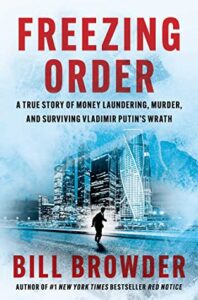Evgenia Kara-Murza (above) from Daniel Lippman on Vimeo.
The massive economic sanctions brought against Russia for its invasion of Ukraine have not only punished Russian elites — they have also prompted many countries to examine their complicity in helping corrupt officials launder money and park assets abroad, notes Columbia University professor Timothy Frye, the author of “Weak Strongman: The Limits of Power in Putin’s Russia.” Bill Browder’s new book, “Freezing Order: A True Story of Money Laundering, Murder, and Surviving Vladimir Putin’s Wrath,” is an essential work by someone who understood long before the rest of the world did just how far corrupt Russian officials and businesspeople will go to defend their ill-gotten wealth, and how foreign lawyers, lobbyists and public relations firms enable them.
 Key to the book’s story are the U.S. Justice Department’s attempts to freeze properties in New York City purchased by [Russian company] Prevezon using assets generated from the tax fraud scheme uncovered by Magnitsky. Much of the tale centers on Prevezon’s creative attempts to prevent the U.S. government from freezing its assets. Two broader lessons emerge, he writes for The Washington Post:
Key to the book’s story are the U.S. Justice Department’s attempts to freeze properties in New York City purchased by [Russian company] Prevezon using assets generated from the tax fraud scheme uncovered by Magnitsky. Much of the tale centers on Prevezon’s creative attempts to prevent the U.S. government from freezing its assets. Two broader lessons emerge, he writes for The Washington Post:
- First, the system, even in its weak and problematic condition, can work. Despite attempts to discredit Browder, to intimidate witnesses and to buy the best legal counsel available, Prevezon ultimately lost the case, the sanctions remain in place, and Browder is not doing time in Siberia…
- Second, it takes enormous effort and courage to make the system work. Beyond Browder’s team, we all owe a great debt to the talented researchers and journalists at organizations like the Organized Crime and Corruption Reporting Project, who are incredible guides through the murky world of money laundering and asset hiding, and who provided much of the material for the Prevezon case and many other investigations.
 Browder’s book also features “heroic Russians” like Boris Nemtsov and Vladimir Kara-Murza, who was jailed this week, Frye adds.
Browder’s book also features “heroic Russians” like Boris Nemtsov and Vladimir Kara-Murza, who was jailed this week, Frye adds.
At a Washington launch party for Browder’s book, Evgenia Kara-Murza, addressed the crowd, reading a letter written by her husband (see above or here), POLITICO reports.
Kara-Murza can’t be accused of naivete, say Ellen Bork and David J. Kramer. He nearly died from poisonings in Moscow in 2015 and 2017. Although responsibility hasn’t been established, the open-source investigative outfit Bellingcat has shown that Kara-Murza was closely shadowed by FSB operatives both times, they write for the Dispatch:
 Bellingcat documented similar surveillance of the imprisoned anti-corruption activist Alexei Navalny leading up to his poisoning on an airplane in Russia in 2020. After recovering, Navalny relied on this information to place a priceless “crank call,” in which he impersonated a senior FSB official to receive a debrief from one of the operation team’s members. Navalny, who like Kara-Murza returned to Russia after recovering from his poisoning, is now serving jail sentences on spurious charges.
Bellingcat documented similar surveillance of the imprisoned anti-corruption activist Alexei Navalny leading up to his poisoning on an airplane in Russia in 2020. After recovering, Navalny relied on this information to place a priceless “crank call,” in which he impersonated a senior FSB official to receive a debrief from one of the operation team’s members. Navalny, who like Kara-Murza returned to Russia after recovering from his poisoning, is now serving jail sentences on spurious charges.
National Endowment for Democracy President and Chief Executive Officer Damon Wilson described his last conversation with Kara-Murza before returning to Russia in April 2022.
“He explained his decision to return home by citing a woman who was one of seven participants on Red Square protesting the August 1968 invasion of Czechoslovakia. She told [Kara-Murza] her reasoning: ‘A nation minus even one person is no longer an entire nation. A nation minus me is not an entire nation … So they could no longer say that there was nationwide approval in the Soviet Union for the invasion of Czechoslovakia.’”
 Even after two poisonings, Kara-Murza will not stop fighting, his wife, Evgenia, told PRI’s The World.
Even after two poisonings, Kara-Murza will not stop fighting, his wife, Evgenia, told PRI’s The World.
“Even if I bring him back, he will continue his fight and he will probably go back and continue it there. He’s an amazing person and a true Russian patriot,” she said. “You know, he’s the true Russian patriot because he believes that you cannot equate the country to its regime.”
Kara-Murza once wrote of Russia in the Washington Post, “If society is unable to express its opposition through the ballot box, it will find another way,” notes analyst Dirk Mattheisen. It may be asking a lot of Russian society to change, but change is possible, he writes for EuromaidanPress:
Oppression, assassination, punitive jailings, gulag, and harsh extra-judicial punishment are not inevitable. Russians themselves are not cultural artifacts. They can think and act. It is important not to underestimate Russian society’s potential to realize European humanism and not to underestimate how much Russia needs to be part of Europe. RTWT
Russia needs what other societies have experienced, a truthful accounting of the past in order to build a proper relationship between society and the state https://t.co/eB695YxDOJ via @EuromaidanPress
— Democracy Digest (@demdigest) April 15, 2022







